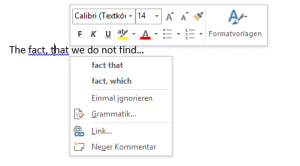I’m no expert on official punctuation rules, and there’s quite a bit of freedom in English anyway, but here’s one thing that will reduce mistake (and annoyance) rates drastically for some people: Germans, please don’t transfer German Kommaregeln to English! I know you’ve probably put a deal of effort into learning this in high school, but German punctuation rules, I regret to inform you, will lose rather than win you points in English. So please: DON’T PUT A COMMA IN FRONT OF EVERY THAT! That can be a relative pronoun (like which, which requires a comma if/because a non-defining relative clause ensues) or a conjunction, and in neither case does it need a comma!

Personally, I don’t think we should transfer English punctuation practices to German, either. I never put commas in front of the main verb (as in Anders gesagt, sind…)—after all, German’s a V2 language, and the position before the verb can be filled by complex constituents, so there’s no reason why I should. 🙂 But I think the Duden’s against me on this one. 🙁 In any case, you should have a good reason for putting a comma before the main verb in German. This is a general rule of thumb, actually: You should have a good reason for any comma you put.

